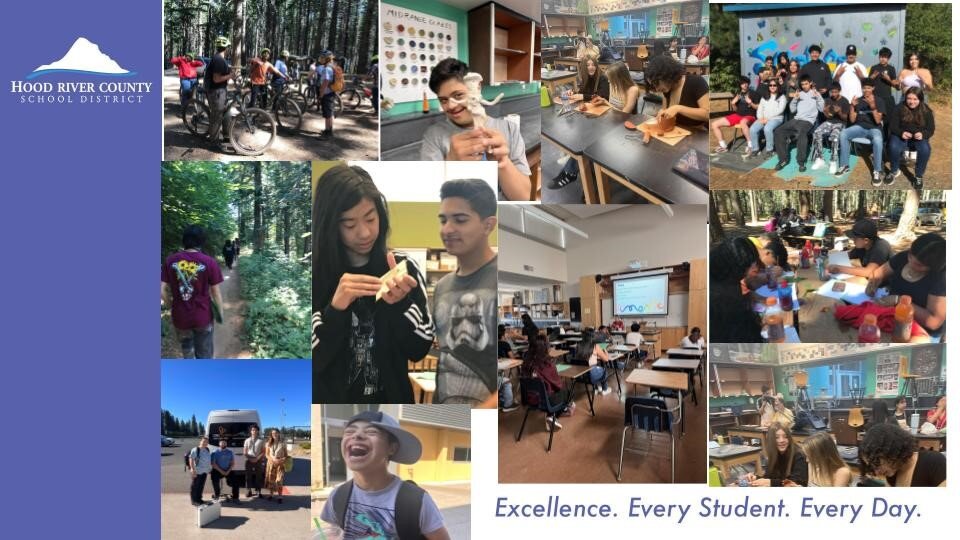
The Hood River County School Board receives a report every fall on summer programs, one of the district’s priorities. (Photo courtesy of Hood River County School District)
Education advocates pressed legislative leaders this week to provide additional funding for summer programs. A crucial summer learning bill moved forward Wednesday, although with a significantly reduced allocation.
The Joint Ways and Means Education Subcommittee amended House Bill 4082 to provide $30 million for summer programs from an existing Student Success Act account. The initial bill supported by Gov. Tina Kotek and education advocates had proposed $50 million from the General Fund. The amended bill is now headed to the full Ways and Means Committee.
Emielle Nischik, OSBA’s acting executive director, said the association is grateful legislators have ensured students’ needs are being considered among the state’s other pressing priorities but the smaller amount highlights Oregon’s chronic problem of underfunding schools.
“We can’t continue to pretend that we are making the investment that our students need,” said Nischik. “At a time of record Oregon revenue, we need to prioritize decisions that help our young people regain ground they lost during the pandemic.”
Nischik said the funding was a first step in recognizing the need for year-round supports for Oregon’s most vulnerable students. She appreciated that the bill includes creating a workgroup to explore more adequate and stable funding.
According to estimates by the Oregon Department of Education, a $50 million allocation would have served between 32,000 and 38,000 students in 53 school districts. The reduced funding would serve between 18,000 and 24,000 students in 32 school districts. Oregon has nearly 550,000 students in 197 districts.
The bill focuses support on students most in need. By reducing the amount, thousands fewer students will have a chance to catch up from pandemic disruptions or enjoy the kinds of enriching activities their better-off classmates routinely experience, said Efren Zamudio, OSBA Legislative Services specialist.
“We are looking for the Legislature to prioritize students’ academic recovery from the pandemic or else a whole generation of Oregonians will fall behind,” Zamudio said.
Sofia Rodriguez, a sophomore in the migrant education program at Hood River Valley High School, is one of those students who had her life changed by a summer program.
Rodriguez took a college-readiness class last summer that taught her skills such as resume building. She said the class gave her organizing tips that help her every day and made her realize how much support she has at school. It inspired her to want to keep going after high school.
Hood River County School Board Chair Chrissy Reitz said quality summer programs are a district priority. In the past three years, Hood River Valley High School students have earned more than 400 recovery and elective credits.
Reitz said they stress academics but also provide experiences that help students grow, such as a trip to Portland. She said many of the students had never been to Portland, even though it is just an hour to the west.
“It made their world bigger,” Reitz said. “Those programs can be life-changing and eye-opening.”
Without additional funding, though, Hood River will have to significantly cut back this year, she said.
It’s not clear yet how a reduced HB 4082 will affect Hood River County and other districts like it, but the loss of opportunity for some of Oregon’s most at-risk students is unquestioned. National studies have conclusively shown summer programs’ benefits, ranging from students’ academic improvement to increased engagement with their schools and social and emotional growth.
The $50 million sought was considerably less than previous Legislatures put forth. As the pandemic’s shock waves were being felt in 2021, the Legislature allocated $200 million to school districts for summer learning to try to help students reengage and catch up. In 2022, the Legislature appropriated an additional $100 million. The 2023 session was derailed by a Republican walkout, and no summer learning funding passed.
Hood River serves around 3,800 students, with nearly half of them Latino and 11% classified as migrant students. They felt the cut in funding in 2022 and the loss in 2023. Programs were eliminated or restricted, the number of days was reduced, and fewer students were able to earn high school credits.
Interim Superintendent Bill Newton said the summer programs connect everything to academics, but the district also must give students incentives to come to school. The district has offered classes on things such as woodworking, cooking, yoga, fishing and flying.
“It gets them excited about being in school, gets them excited about things not always in their view,” Newton said.
HB 4082 would give grants to school districts that already have summer program plans and would prioritize collaborations with community partners to get the most out of every dollar. Districts with more students in groups that have historically faced disparities would be first in line for the enrollment-based grants.
Districts must provide at least 80 hours of programs that include academic enrichment, equitable access and social and emotional development.
HB 4082 also directs the Oregon Department of Education to create a plan to address academic disparities through after-school and summer learning programs and propose a funding stream for it.
Rep. Susan McLain, the subcommittee co-chair and a former teacher, was particularly excited about the prospect of creating sustainable support for summer learning.
“This is the first step, but we are going to continue just walking that road,” said McLain, D-Hillsboro and a chief sponsor of HB 4082.
– Jake Arnold, OSBA
jarnold@osba.org